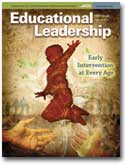Invest in the Whole Child
- Sign ASCD's New Learning Compact for the Whole Child.
- Rate your own school and community and see how well they stack up.
- Celebrate people in your own community who are doing great things for kids.
- Share your story.
- Learn more about the challenges facing kids today and how other communities are responding to these challenges.
A Plus for Institutional Membership
ASCD has introduced a new option to the Institutional Membership category. ASCD Institutional Plus offers all the benefits of Institutional Membership (10 subscriptions to Educational Leadership magazine and Education Update newsletter, 10 online courses, two conference and institute vouchers, and other resources), as well as five member books for each of the 10 participating members. For more information on Institutional Plus, visit www.ascd.org/institutional.
Resources
Advocating Quality Education
- Adjust the Adequate Yearly Progress (AYP) model to incorporate multiple measures of assessment, including growth models, formative assessments, grade point averages, student exhibitions, advanced placement and International Baccalaureate courses, and portfolios.
- Offer the full complement of sanctions and intervention strategies immediately. Schools should be able to choose between supplemental service options and public school choice.
- Require supplemental service providers to use only “highly qualified” instructors.
- Enable states to determine requirements for “highly qualified” teachers.
- Expand the Teacher Incentive Fund and similar programs that provide incentives to teachers and school leaders who work in high-poverty school districts.
- Increase targeted federal resources to schools and programs that serve the neediest children by increasing the weighting factor of poverty in formulas.
- Redesign current competitive grant programs to programs that will drive funds to those school districts with high-poverty and high-need students.
- Allow English language learners the flexibility to demonstrate progress over the course of three years.
- Support student-specific Individualized Education Programs (IEPs), rather than state assessments, as measures of learning for students with disabilities.
